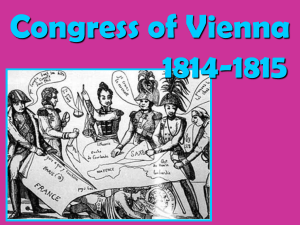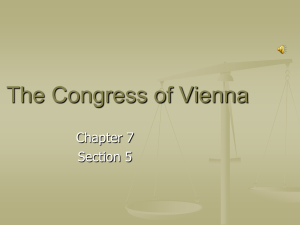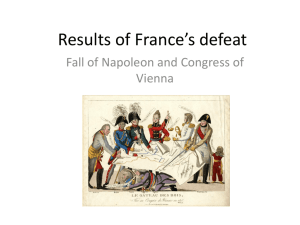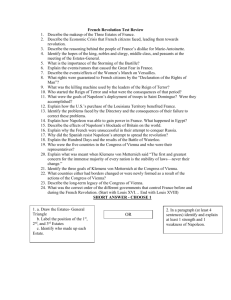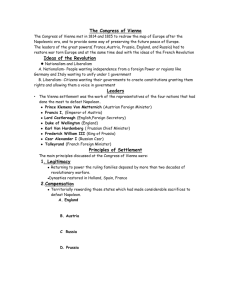Congress of Vienna: Restoring Europe After Napoleon
advertisement
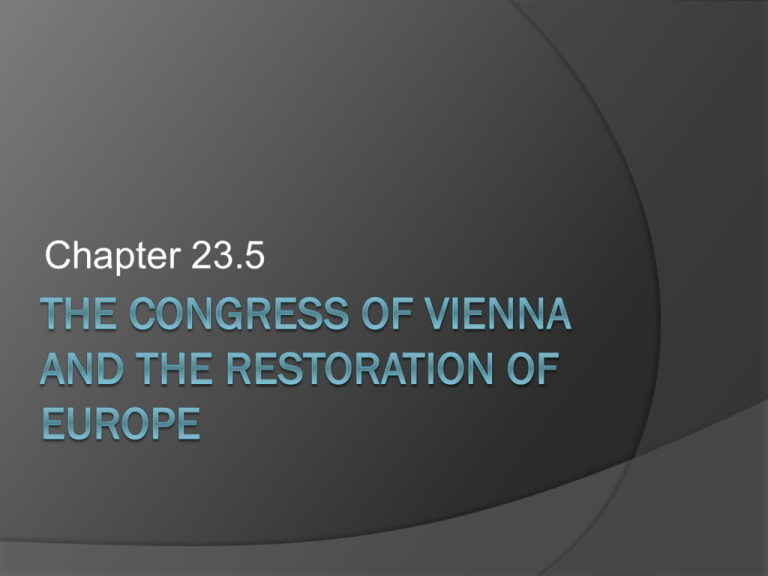
Chapter 23.5 First Question: The Congress of Vienna was a series of meetings of European heads of government looking to establish long-lasting peace and stability in Europe after the defeat of Napoleon. Question #2: The Congress of Vienna took place from 1814 to 1815. It was originally supposed to last only four weeks. Instead, it went on for eight months! It was punctuated by Napoleon Bonaparte’s return to power from March to July 1814 (although work continued uninterrupted). NAPOLEON WAS DEFEATED AT THE BATTLE OF WATERLOO, June 18th, 1814; a sigh of relief for the participants of the Congress of Vienna! Question #3: PURPOSE OF THE CONGRESS OF VIENNA TO PREVENT FURTHER FRENCH AGGRESSION (CONTAINMENT) TO “UNDO” THE CHANGES BROUGHT BY THE FRENCH REVOLUTION AND NAPOLEON BONAPARTE and STOP THE SPREAD OF “DANGEROUS” IDEAS TO RESTORE THE “OLD ORDER” OF MONARCHY AND ARISTOCRATIC POWER- LEGITiMACY Perhaps most importantly: TO RESTORE THE BALANCE OF POWER AMONG THE EUROPEAN STATES Question #4: There were hundreds of participants in the Congress of Vienna, including kings, princes, dukes and duchesses; each with their own agenda, but only a handful of representatives made the real decisions. The Five Great Powers Austria (the host country) Russia Prussia Great Britain France PRINCE METTERNICH OF AUSTRIA ARISTOCRATIC FOREIGN MINISTER OF AUSTRIA WAS A CONSERVATIVE THE OLD ORDER OF MONARCHY AND ARISTOCRATIC RULE WITH A STRONG BUREAUCRACY OPPOSED THE IDEALS OF THE FRENCH REVOLUTION: NATIONALISM & LIBERALISM SAW THEM AS A THREAT TO THE BALANCE OF POWER IN EUROPE “When France sneezes, all of Europe catches a cold.” WAS SO INFLUENTIAL, THE PERIOD FROM 1814-1848 BECAME KNOWN AS THE AGE OF METTERNICH AND PLAN TO RESTORE PEACE TO EUROPE BECAME KNOWN AS THE METTERNICH SYSTEM LORD ROBERT CASTLEREAGH OF GREAT BRITAIN BRITISH FOREIGN MINISTER SOUGHT TO MAKE SURE THAT THE POWERS IN EUROPE WERE BALANCED FEARED RUSSIAN, PRUSSIAN, AND FRENCH POWER “ENGLAND HAS NO PERMANENT FRIENDS, ONLY PERMANENT INTERESTS.” CHARLES MAURICE DE TALLEYRAND OF FRANCE FRENCH FOREIGN MINISTER SOUGHT TO PRESERVE FRENCH TERRITORY GAINED BY NAPOLEON FOUGHT TO INCLUDE HIMSELF (AND FRANCE) IN THE INNER NEGOTIATIONS CZAR ALEXANDER I OF RUSSIA CONSIDERED HIMSELF A GUARANTOR OF EUROPEAN SECURITY SOUGHT TO GAIN CONTROL OVER ALL OF POLAND HEAVILY INFLUENCED BY RELIGIOUS MYSTICISM KING FREDERICK WILLIAM III OF PRUSSIA HE AND HIS MINISTERS WERE ABLE TO SECURE IMPORTANT TERRITORIAL GAINS FOR PRUSSIA BECAME A POLITICAL REACTIONARY AND RENEGED ON HIS PROMISE TO SUPPLY PRUSSIA WITH A CONSTITUTION Question #5 Nations around France were made stronger The Austrian Netherlands and the Dutch Republic were combined to form the Kingdom of the Netherlands, providing for a strong country on France’s northern border 38 independent German states were joined together to create the German Confederation, providing a strong power to the east of France Switzerland was recognized as an independent (but neutral) nation The Kingdom of Sardinia was strengthened, providing for a strong power to the south of France National boundaries were changed to contain France’s power Question #6: Balance of power is when nations have relatively the same amount of power which prevents any one nation from getting too powerful. Redrawing the Map of Europe Question #7: Defining Legitimacy Legitimacy means lawful. A legitimate ruler is one who has the right to rule whether it be because of his/her hereditary right to rule or the people give him/her the right to rule through a fair election. During Napoleon’s rule, he had replaced many of the legitimate rulers and placed his siblings on the throne. Illegitimate Rulers… e e e e e e e Jerome Bonaparte - King of Westphalia. Joseph Bonaparte - King of Spain Louise Bonaparte - King of Holland Pauline Bonaparte - Princess of Italy Napoléon Francis Joseph Charles King of Rome Elisa Bonaparte - Grand Duchess of Tuscany Caroline Bonaparte - Queen of Naples Example of restoring a legitimate ruler to the throne: LOUIS XVIII IS RESTORED AS THE BOURBON MONARCH OF FRANCE Question #8: The Competing Philosophies at the Congress of Vienna Conservatives- usually wealthy property owners and nobility. They argued for protecting the traditional monarchies of Europe. They want little to no change to the old order. Liberals- mostly middle-class business leaders and merchants. They wanted to give more power to elected parliaments, but only the educated and the landowners would vote In a nutshell, liberalism means wanting a constitution. Having a constitution gives power to the people, thereby taking power away from the monarchs and nobility. Constitutional reforms often coincided with demands for national self-determination Radicals- favored drastic change to restore democracy to all people. They believed that governments should practice the ideals of the French Revolution: liberty, equality, fraternity Question #9: Nationalism Promoted national and cultural unity that could become a political “reality” Language Ethnicity Territory Religion French nationalism propelled Napoleon to power, but it also led to his downfall as countries under French domination eventually rebelled against Napoleon Fear This! The conservative old order (Metternich and the Congress of Vienna) feared nationalism’s threat to the balance of power in Europe The emergence of new nation-states and the redrawing of national borders was seen as a threat to the major powers of Europe Nationalism’s focus on democratic and liberal reforms also worried Europe’s power elite Rising nationalism would create an environment of “aggression and conflict” Did they have a right to be afraid? Look @ history- Bosnia/Croatia, Czechoslovakia, Russia Question # 10: THE CARLSBAD DECREES IN THE GERMAN CONFEDERATION ISSUED IN 1819 SUPPRESSED ANY OPPOSITION TO METTERNICH’S CONSERVATIVE POLICIES PRESS CENSORSHIP WAS IMPOSED A SECRET POLICE AND SPY NETWORK KEPT TRACK OF AND ROOTED OUT OPPOSITION THE GOVERNMENT CRACKED DOWN ON UNIVERSITIES (STUDENTS AND TEACHERS) WHICH OFTEN CHALLENGED GOVERNMENT POLICIES AND TENDED TO FAVOR A MORE LIBERAL COURSE Question #11: The Concert of Europe The Concert of Europe was a series of alliances devised by Metternich that assured nations would help one another if any revolution broke out. THE QUADRUPLE ALLIANCE GREAT BRITAIN RUSSIA PRUSSIA AUSTRIA Would briefly become the Quintuple Alliance when France joined, but Great Britain would eventually drop out over the argument of Greek independence (another example of the power of nationalism). THE HOLY ALLIANCE 1815 Formed by Czar Alexander I, Emperor Francis I of Austria, and King William Francis I of Prussia to combat the forces of revolution (liberalism and nationalism) They pledged to base their relationships with other nations on Christian principles Short-lived The Holy Alliance, 1815 Question #12: The Congress of Vienna… Short-term Success; Long-term Failure Influenced world politics for the next 100 years Led to peace in Europe for the next 18 years Decreased the size and power of France Increased the power of Britain and Prussia Increased nationalism in Italy, Germany, Greece, and other areas put under foreign control These nationalistic feelings would lead to revolutions in 1830 and 1848 These revolutions would lead to new nations being formed and the independence of Spanish colonies.
